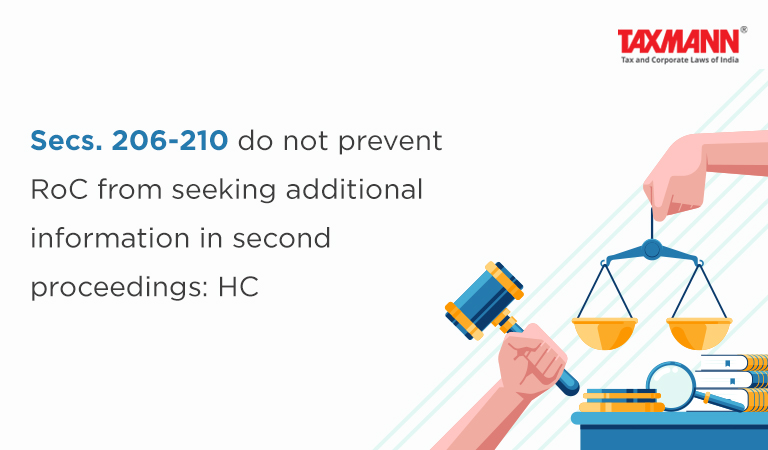Secs. 206-210 do not prevent RoC from seeking additional information in second proceedings: HC
- Blog|News|Company Law|
- 2 Min Read
- By Taxmann
- |
- Last Updated on 27 January, 2023

Case Details: Shree Radhe Tea Plantation (P.) Ltd. v. Registrar of Companies, West Bengal - [2023] 146 taxmann.com 176 (HC-Calcutta)
Judiciary and Counsel Details
-
- Moushumi Bhattacharya, J.
- Abhrajit Mitra, Shaunak Mitra, Sanket Sarangi, Deepam Sarkar, Sanjiv Kr. Trivedi, Iram Hassan & Subhajit Ghosh, Advs. for the Petitioner.
- Avinash kanakani, Adv. for the Respondent.
Facts of the Case
In the instant case, winding-up proceedings were initiated against the petitioner company before the Adjudicating Authority (NCLT) in May, 2022. During the course of such proceedings, the petitioners came to know of the inquiry report dated 13.04.2021 initiated against them.
Consequently, the petitioners sought an injunction to restrain the respondent – ROC from taking any further action in pursuance of the said inquiry report. The petitioners contended that ROC cannot initiate multiple proceedings under section 206(4) of the Companies Act, 2013 in respect of the same alleged contraventions.
The question that arose for consideration before the High Court was whether sections 206-210 of the Companies Act, 2013 contain a bar on the Registrar calling for information or conducting an inspection or inquiry.
Section 206(4) read as follows –
If the Registrar is satisfied on the basis of information available with or furnished to him or on a representation made to him by any person that the business of a company is being carried on for a fraudulent or unlawful purpose or not in compliance with the provisions of this Act or if the grievances of investors are not being addressed, the Registrar may, after informing the company of the allegations made against it by written order, call on the company to furnish in writing any information or explanation on matters specified in the order within such time as he may specify therein and carry out such inquiry as he deems fit after providing the company a reasonable opportunity of being heard.
High Court Held
The High Court observed that the presumption that the impugned report dated 13.04.2021 should be stayed since a parallel inquiry had been initiated in July, 2022 was not borne out from the relevant statutory provisions.
The High Court held that sections 206-210 didn’t contain a bar on the Registrar calling for information or conducting an inspection or inquiry if the Registrar comes across additional material warranting a second proceeding under section 206 of the Companies Act, 2013.
The High Court, further held that given the wide powers of the Tribunal under section 273, there was no reason to hold that the petitioners would not get an opportunity in winding up proceedings to seek appropriate orders with regard to the impugned inquiry report. Therefore, the impugned inquiry report couldn’t have been interfered with.
Disclaimer: The content/information published on the website is only for general information of the user and shall not be construed as legal advice. While the Taxmann has exercised reasonable efforts to ensure the veracity of information/content published, Taxmann shall be under no liability in any manner whatsoever for incorrect information, if any.

Taxmann Publications has a dedicated in-house Research & Editorial Team. This team consists of a team of Chartered Accountants, Company Secretaries, and Lawyers. This team works under the guidance and supervision of editor-in-chief Mr Rakesh Bhargava.
The Research and Editorial Team is responsible for developing reliable and accurate content for the readers. The team follows the six-sigma approach to achieve the benchmark of zero error in its publications and research platforms. The team ensures that the following publication guidelines are thoroughly followed while developing the content:
- The statutory material is obtained only from the authorized and reliable sources
- All the latest developments in the judicial and legislative fields are covered
- Prepare the analytical write-ups on current, controversial, and important issues to help the readers to understand the concept and its implications
- Every content published by Taxmann is complete, accurate and lucid
- All evidence-based statements are supported with proper reference to Section, Circular No., Notification No. or citations
- The golden rules of grammar, style and consistency are thoroughly followed
- Font and size that’s easy to read and remain consistent across all imprint and digital publications are applied



 CA | CS | CMA
CA | CS | CMA
